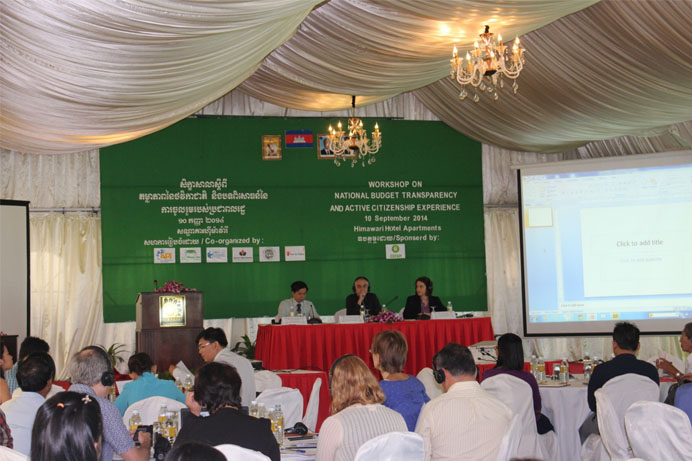
Phnom Penh, September 10, 2014: A one-day workshop on “National Budget Transparency and active citizenship experience” was held at the Himawari Hotel, and about 100 representatives from Development Partners, NGOs/CSOs, media and Budget Working Group members attended.
This event, organized by The NGO Forum on Cambodia (NGOF) in collaboration with the Budget Working Group (BWG) provided opportunities for NGOs and media in Cambodia to learn about a range of budget issues. Keynote speakers from other countries and Cambodia shared their experience and discussed the importance of budget information across a variety of sectors. Among the issues to be highlighted was how changes in transparency and accountability can lead to improved development outcomes. The workshop also allowed participants to share ideas about how to improve budget transparency in Cambodia.
“There was only one time in 2011, that the government shared to the draft national budget to the civil society for the review, since then they were very quiet, and according to them the time constrain is the main reason to block our participants. However, the publication of the national budget is very important not only to the civil society but to the citizens themselves to understand what is the government’s plan on the expense of the national budget after they pay their tax every year,” said Mr. Tek Vannara, NGOF’s Executive Director at the workshop.
According to the findings from the Open Budget Survey (OBS) 2012, Cambodia ranks among the countries that provide the public with little information on the central government’s financial documents. These documents are either unpublished, or published irregularly and too late to be useful for monitoring purposes.
“The public participant in the national budget is the main key to filling the holes to shape the draft in response to the development and the social need. Hence, we are conducting the workshop today to give civil societies the detail understanding about the national budget, why do we need then and what are the effective strategic advocacies we can do to solve the problem,” he continued.
The 2014 national budget approved last November by the Assembly amounted to $3.4 billion, up $400 million from the year before, with education, security and national defense experiencing the biggest influxes of cash. The budget also included $1.5 billion in unspecified funds, which lawmakers later said would be spent on about a dozen “targets,” but which was under the control of Prime Minister.
“People pay the tax to the government, so the government has to rule to share the to the citizens on annual national budget expense which is approved by the national assembly to all the ministries to use. This is now the government could build the accountability to their people,” Mr. Mom Sambath, DPA’s Executive Director said.
Since 2006 NGOF’s Development Issues Program (DIP) and National Budget Project (NBP) have been conducting analyses on the annual national budget, monitoring its implementation and advocating for public access to budget information. Since budget issues are cross-cutting, the project has been encouraging sector NGOs/CSOs to incorporate and take up budget monitoring work in their sector. As a result of increasing interest, a Budget Working Group (BWG) formally established on the 19th of February 2014. The BWG members are The NGO Forum on Cambodia (NGOF), Oxfam America (OA), Transparency International Cambodia (TIC), Cambodians for Resource Revenue Transparency (CRRT), Advocacy and Policy Institute (API), Development and Partnership in Action (DPA) and Save the Children. The BWG’s main objective is to improve the budget transparency including revenue from extractive industry sector and contribute to discussion and debate about budget issues in Cambodia.